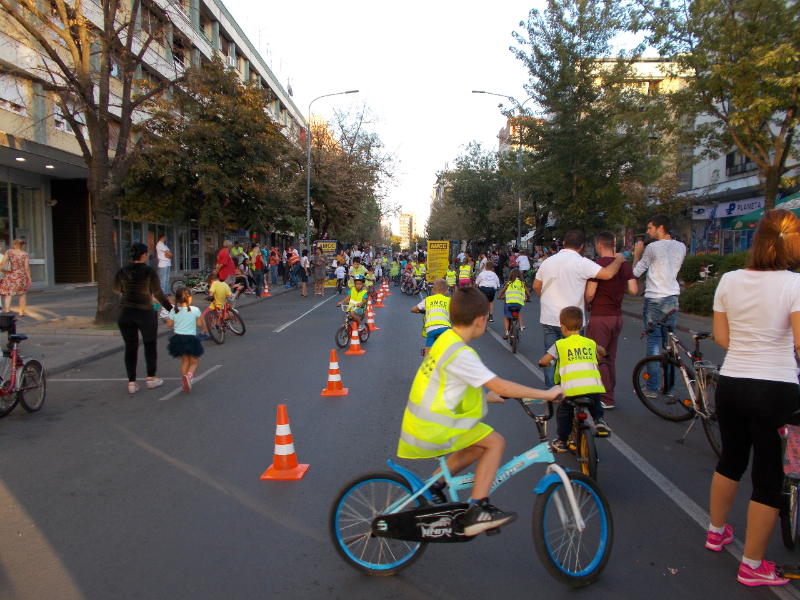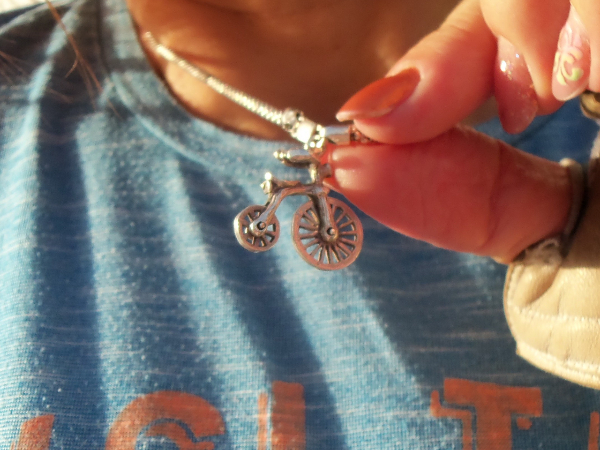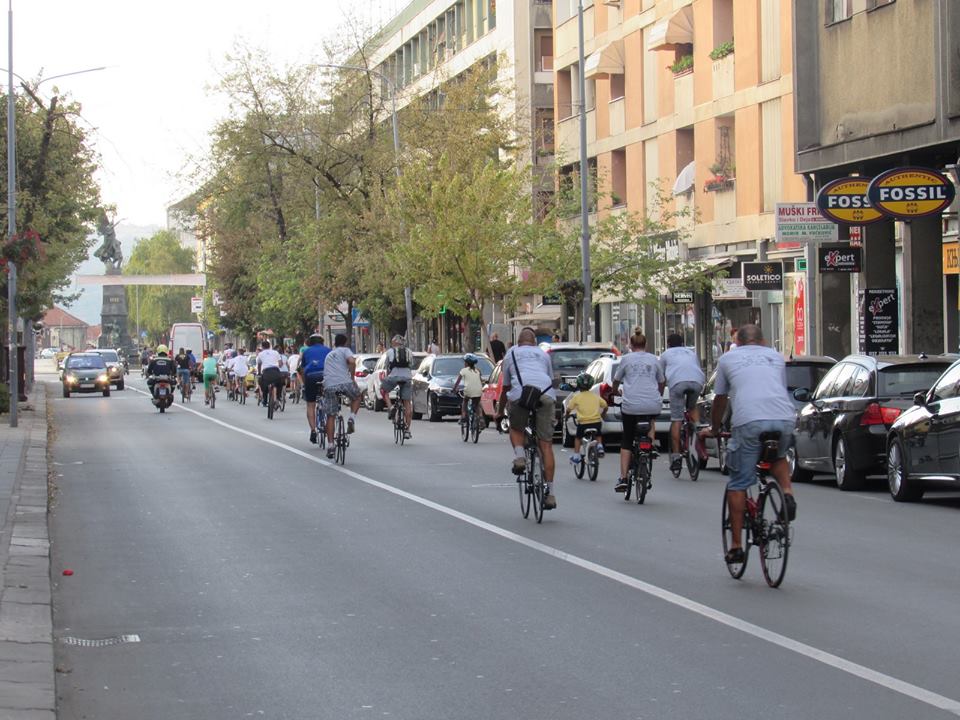
#VisionaryCities Series: Sustainable urban mobility in Kruševac
The #VisionaryCities Series is a collection of best practices and success stories from visionary local authority leaders contributing to making Cycling in Europe better, safer and more common. We are going to be inviting some of them to share their thoughts and visions with ECF.com in the coming months.
 Jelena Nikolić is adviser for Energy eficiency ans sustainable urban mobility at Administration of the City of Kruševac (Serbia). She studied Architectural and constructive design of all types of buildings, urban planning and interior design at the University of Nis. She was one of the stronger promoters of the city's Sustainable Urban Mobility Plan.
Jelena Nikolić is adviser for Energy eficiency ans sustainable urban mobility at Administration of the City of Kruševac (Serbia). She studied Architectural and constructive design of all types of buildings, urban planning and interior design at the University of Nis. She was one of the stronger promoters of the city's Sustainable Urban Mobility Plan.
A need for change
Kruševac is a Serbian city counting around 130,000 inhabitants and laying in the valley of West Morava, on Rasina river. It is an ideal place for everyday cycling, considering its size, landscape, climate and since most of the services and main points of interest can be reached with a 15 minutes ride. There is a bike factory in the city and the cycling route "EuroVelo 11" - the Eastern European route passes through the urban and rural part of the city, but this potential is not sufficiently exploited due to the insufficiently developed cycling infrastructure.
Although, currently cycling only reaches 3% in the modal split, along with walking 44%, private cars 32%, public transport 19%, taxi 2% [1]. That's because for several decades, the infrastructure development practice was focused on meeting the needs of the car, like in many other cities, which has led to a constant increase in the number of vehicles, and that affects on the public space use, traffic congestion, air quality, noise, the sence of safety of all road users and the accessibility.
 A participative approach to Sustainable Urban Mobility
A participative approach to Sustainable Urban Mobility
These facts have encouraged the city to change the approach to solve problems, through the development of a Sustainable Urban Mobility Plan (SUMP) and the involvement of various actors, not only traffic planners.
Krusevac is the first city in Serbia, and among the few in the wider Balkan region, which has developed and adopted a SUMP. Since there are no national regulations and guidelines in this field, the participation of the City of Kruševac as a "follower city" in several European projects such as "TIDE", "SWITCH" and "FLOW", then active membership in the CIVINET Slovenia, Croatia, South East Europe network and study visits within the framework of the "BUMP" and "CIVITAS SATELLITE" projects, helped in the process of SUMP development.
The involvement of various actors in the SUMP development process and the organization of various promotional activities had a significant impact on changing the attitude about urban mobility and the public spaces use, not only as the exclusive car right.
In 2015, the City administration took advantage of the European Mobility Week to roll-out great initiatives and innovative campaigns. One example is the "Play-out street" initiative: during 7 days, the city center was closed to motorised traffic and converted to a pedestrian zone to show citizens how public spaces - usually occupied by cars - can be used in a different way. At the same time, this helped decision makers to follow the reactions of all participants in traffic.
Thanks to the extremely positive reaction and demands of citizens, this year the center of the city will be dedicated to active modes every day from 1st May to 1st October from 6PM-10PM. This measure is best accepted by the youngest citizens who have used this space to improve the skills of riding a bikes, kick-bikes, roller skates and hoverbords, which gives hope that future generations will be more focused on sustainable modes of transport if the infrastructure is adapted.
Complementing hard infrastructure with soft measures
But education and awareness-raising campaigns are as important as the infrastructure, and as one of the proposed SUMP measure in this field is the establishment of a network of mobility coordinators in kindergartens, primary and secondary schools (optional for high schools). The mobility coordinator is a link between local government and institution users. The Kruševac's SUMP 2017-2030 was adopted at the City Assembly on November 27, 2017, and the network of the mobility coordinators was established in February 2018. In total there are 37 school coordinators in urban and rural part of the city.
The SUMP defines the ambitious goal "80-20" in modal split by 2030: sustainable modes 80% vs. private cars 20%, and with the realization of the vision of a "city accessible to all citizens", regardless of age, gender, physical and metal capabilities and income.
In order to achieve this vision the city invested a lot of energies and resources in the improvement of pedestrian and bicycle infrastructure and accessibility. In the industrial zone in the northern part of the city, the existing bicycle path was reconstructed and a new bicycle path in the southern part of the city was built. The aim is to connect these two paths in order to form the main city cycling route, and then to develop the secondary network. This route coincides with the long route EuroVelo 11.
As the realization of this idea requires certain changes in the organization of traffic, such as removing some on-street parking lots and some infrastructure works, a promotional bike ride along the future route was organized during the European Mobility Week 2017. This activity attracted a large number of citizens, and the youngest participant on 2 wheels was only 3 years old that rode accompanied by his parents.
 Sharing experience and challenges
Sharing experience and challenges
During the development of the SUMP, the city willingly shares its experience with other cities in the region. In February 2018, Krusevac hosted the annual assembly and round table of the CIVINET network, which attracted a large number of participants from Slovenia, Croatia, Montenegro, Macedonia, Serbia and Bosnia and Herzegovina. The fact that Krusevac was shortlisted for the Award European Mobility Week 2016 and received the National Ombudsman Recognition for contributing to the development of all forms of accessibility in his territory in 2016, marks that so far mobility efforts have been noticed.
Regions:
News category:
Network/Project Involved:
Contact the author
Recent news!
Upcoming events
Contact Us
Avenue des Arts, 7-8
Postal address: Rue de la Charité, 22
1210 Brussels, Belgium









